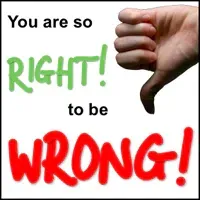Congratulations - you're wrong!
Written by

Philip Patston reflects on the power of being wrong and how good at it the creative community is. He also shares a personal insight into his own fallibility.
* * *
You’ve probably noticed my posts this year have been less frequent and shorter. That’s because I’m heavily involved in some exciting new and creative social change projects. I’ve been running the inaugural “Be. Leadership” programme since February; I’m designing an online social change toolkit with the Ministry of Social Development as part of the NZ Government's Campaign to Improve Attitudes and Behaviours Towards Disabled People; and I’m a member of a Ministry of Health National Reference Group to support a new model of delivering disability support. To top it off I’m a judge of Arts Access Aotearoa’s Big ‘A’ Awards and have a huge bound volume of 22 applications sitting on my desk, begging me to wade through it.
The common denominator in these things is that, not only are most of the projects themselves firsts, but they are all areas of work in which, to a large extent, I’ve never been involved before. Hence there is the huge likelihood that things will go wrong. That’s had me feeling slightly on edge.
As luck – or destiny depending on your frame of mind – would have it, I happened upon a fantastic TEDTalk a couple of weeks ago by Kathryn Schulz, entitled “On being wrong” (embedded below). Schultz confronts directly the human need to be right all the time, exposing it as a fundamental flaw in logic. She acknowledges that, though we often grudgingly admit we learn from our mistakes, we still feel bad, embarrassed, even a failure, when we are wrong.
Actually, she insightfully corrects, we feel those things when we realise we are wrong – the act of being wrong (before we realise) feels exactly like being right. And our attachment to being right (or our denial that we could be wrong), she cautions, is precisely what keeps us from preventing mistakes that can cause catastrophies like nuclear meltdowns and wars.
On reflection I notice in my work with artists, performers and other creatives, that we are rather good at being wrong. An artist may start with a blank canvas and an idea of what they may paint; the outcome may be completely different. A playwright or novelist may start with an outline of a story; but the act of writing may itself change the original course of events. In my own experience on stage, many a fluffed line or tangent of thought, when left uncorrected, have created new routines and ideas, not to mention an unexpected laugh.
The same is true for the people with whom I work in social change. We have an idea that we think may improve systems, structures and lives; but we have no idea whether we’re right until we start executing that idea. The risk is high – until we start and possibly get it wrong, we can’t begin to get it right. But if we are not alert enough to notice as soon as we are wrong, then we are likely to make it much worse.
So I feel very grateful to Schultz for this insight and for reminding me that, as humans, we get it wrong all the time. It’s in our nature and it is the very trait that allows us to improve, progress and evolve.
In fact, I realise in the process of writing this, that I’ve been wrong in my negative reaction to the question I’m often asked as a perceived disabled person: “What’s wrong with you?” I have always responded by struggling to change their belief that disability is wrong.
But from now on I’m just going to relax, smile and say, “Just about everything – I’m human, just like you. Congratulations for noticing!”